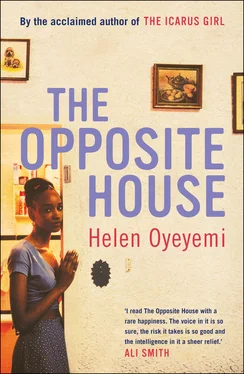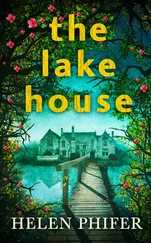Helen Oyeyemi - The Opposite House
Здесь есть возможность читать онлайн «Helen Oyeyemi - The Opposite House» весь текст электронной книги совершенно бесплатно (целиком полную версию без сокращений). В некоторых случаях можно слушать аудио, скачать через торрент в формате fb2 и присутствует краткое содержание. Год выпуска: 2008, Издательство: Bloomsbury UK, Жанр: Современная проза, на английском языке. Описание произведения, (предисловие) а так же отзывы посетителей доступны на портале библиотеки ЛибКат.
- Название:The Opposite House
- Автор:
- Издательство:Bloomsbury UK
- Жанр:
- Год:2008
- ISBN:нет данных
- Рейтинг книги:4 / 5. Голосов: 1
-
Избранное:Добавить в избранное
- Отзывы:
-
Ваша оценка:
- 80
- 1
- 2
- 3
- 4
- 5
The Opposite House: краткое содержание, описание и аннотация
Предлагаем к чтению аннотацию, описание, краткое содержание или предисловие (зависит от того, что написал сам автор книги «The Opposite House»). Если вы не нашли необходимую информацию о книге — напишите в комментариях, мы постараемся отыскать её.
The Opposite House — читать онлайн бесплатно полную книгу (весь текст) целиком
Ниже представлен текст книги, разбитый по страницам. Система сохранения места последней прочитанной страницы, позволяет с удобством читать онлайн бесплатно книгу «The Opposite House», без необходимости каждый раз заново искать на чём Вы остановились. Поставьте закладку, и сможете в любой момент перейти на страницу, на которой закончили чтение.
Интервал:
Закладка:
‘Hold out your hand,’ he said, smiling. He looked at her as if he thought her beautiful, and this was rare, and this made Yemaya trust him. She held out both her hands, cupping them to carry away sweetness, and he chided her: ‘Greedy. One hand is enough.’
His gift was a loose knot of seeds. They looked like oval woodchips, but something green slept inside them. She wondered what a drop of her vanilla would do to them, and stowed them thoughtfully in the pocket of her top skirt before she remembered to say thank you.
Her watchmaker said, ‘One day, not now, they’ll grow for you, and show you what it is that you most desire. Remember, won’t you?’
She nodded, and he told her then that he was going home. ‘But you must keep those seeds safe. Another time, many years ago, I gave some seeds such as these to a woman as a gift. What this woman most wanted was children, but she was barren. When she spoke of children, I saw how much of her life these dream children had already taken. She knew so much about them, and so little about anything else. She had decided she wanted two boys and a gentle girl, the two boys to take care of the girl and keep each other company. And they would all love each other. I had some of these seeds, and —’
‘Where did you get them from?’ Aya asked, eagerly.
With a wounded stare, the watchmaker said simply, ‘They are mine.’
She raised her hand in apology. He continued: ‘I told her to plant and water them, and to wait and see. She came back to me one month later, shaking. “Those seeds,” the woman said, “are growing.”
‘I said, “Of course.” Her face –
‘She said, “Children. Children are growing from the seeds.”
‘I said, “Of course.” Then I asked her, because she wanted me to ask, what kind of children. But she shook her head. She just shook her head. She couldn’t explain. How many are there? Three. Just as many as she’d wanted. I saw such fear in her. . she asked me what to do, then answered herself. She would leave them buried, her children; maybe that way they would die before they could properly draw breath. A cruel thing — I told her so. But she kept saying, “It is better this way. It is better this way.” ’
The watchmaker stopped speaking — Aya saw that he was lost. She pressed his hand.
‘What kind of children are better left buried?’ he asked her.
She tried to guess the end of his tale, the moral of it. ‘Did you dig the children up?’
He did not.
‘Did she take pity?’
‘She dug them up in their ninth month, and they fled her. They must have known that she never wanted them to draw breath. Children know, and when they know. . it is terrible.’
‘They fled her? How do you know?’
The watchmaker gagged, gaped, put his hand over his mouth, then seemed to recover himself and pretended to wipe dust from his face. ‘I saw them.’
Aya’s vanilla didn’t make the watchmaker’s seeds grow, and neither did plain water. When she dug up the seeds and pocketed them, she wondered whether it was because she didn’t yet know what she wanted.
Dominique and I were good friends until we lost interest in each other. We had only really been friends because she lived two doors away. Then she moved, and nothing. Chabella was disappointed in us both: ‘You’re black girls, as good as sisters!’
Chabella made me phone Dominique a couple of times. I wasn’t allowed to mention that I had phoned against my will. Dominique phoned me a couple of times as well. It was excruciating for us both, and then we were allowed to stop. Even after I stopped, it was awkward for a little bit.
Dominique was in my class from primary school right up until we left sixth form for university. Either I had never looked at her properly, or her face receded beneath the swathes of her hair until I forgot it. Dominique is from Trinidad and she had beautiful hair, soft and thick, which her mother, like mine, banned her from straightening and helped her comb out into a fan. People teased her about it all the time and called her ‘picky head’. Dominique took the name calmly, without offering any insults of her own, which I couldn’t understand. But then some people give off a strange sense of preoccupation, as if there is something in their lives so important to them that they have to keep it silent, and close. And to keep this thing close, they make sacrifices.
Of course, Mami loved Dominique’s hair. And she loved Dominique, who ate everything Mami served at dinner with genuine relish. Dominique tried to teach me some of her sunny, rolling patois. I couldn’t pick it up, but I offered to teach her Spanish. She said, ‘No thanks.’
Dominique’s mum, Cedelka, was a cleaner; she became good friends with Chabella, and her stories about the everyday filthiness of the people she cleaned for racked Mami with guilt. Their conversations always ended with Cedelka assuring Chabella that Chabella worked just as hard as she did, taking care of her family and doing ‘all that language stuff’, and Chabella rhapsodising on Cedelka’s natural wisdom.
Cedelka wore dreadlocks and she was all soulful eyes and beautiful lips. When I played or ate dinner at Dominique’s, or when Cedelka came to collect Dominique from my house, she would reveal an instinct for freezing gracefully, a way of turning her face to the light when she stepped outside.
I always knew when Chabella had been talking to Dominique’s mum because she would start to mutter, ‘I don’t work hard enough, I’m not useful, all this paper and scribbling is making me soft.’ Chabella would take out her sponges and scrubbers and bleach and get on her hands and knees to clean the kitchen and bathroom from corner to corner. Papi didn’t like that. He especially hated it if I helped her, which I did to stop her from crying. ‘I don’t want to see my wife scrubbing away like that,’ he would say. ‘I write textbooks! Chabella, use a mop, or we’ll get a cleaner. And please, my daughter is not your assistant. Maja, go and have a bath and read a book or something.’
‘Get a cleaner! And you just equated this hypothetical cleaning woman with a mop!’ Chabella’s eyes filled with tears.
Papi kissed her, sweat and soap suds and all. ‘I was joking. Forget it.’
He didn’t know that mostly the cleaning was fun once we’d started; it was only the idea of it that made me sigh and drag my feet. We were never very thorough and it was more like play-acting, down on the floor with soapy rags and cleaner rags on our heads as we mimed to The Supremes and The Drifters and Melanie Safka’s ‘Brand New Key’.
Cedelka said to me, half-jokingly, ‘Please don’t try and teach my daughter Spanish! Black people ain’t meant to speak Spanish!’
‘Black people ain’t meant to speak English, neither, then. Or French Creole,’ I said, using exactly the same tone.
Cedelka swatted at my head. ‘You must get that big brain from your big-brain parents.’
I remembered what Cedelka said when I was in Year 9, when the most popular girls in my and Amy Eleni’s form were those with African parents; girls with perfectly straightened hair and mellow gospel voices that changed the sound of the sung school Mass; girls who had (or pretended to have) Igbo, Ewe, Yoruba, Chiga, Ganda, Swahili. They built a kind of slang that was composed of slightly anglicised words borrowed from their pool of languages. The code sounded impossibly cool if you had the right turn of the tongue for it, which I didn’t, although some of the white girls did. Lucy, who started up the slang, was Ugandan; she had a pretty heart-shaped face and a rabidly intent method of marking her netball opponent.
At school a lot of the other girls brought flags out on their countries’ independence days. With permission from the teachers, they tied them around their upper arms or waists and tied their hair up with ribbons in their flags’ colours. On Nigerian Independence Day, one girl did a special assembly on her country and passed around an overwhelming amount of fried Nigerian snacks. Amy Eleni and I were at the back. Amy Eleni put her hand up and said, ‘Can I just ask you what you think of this idea: if your parents taught you to be so proud of Nigeria, how come they’re over here?’
Читать дальшеИнтервал:
Закладка:
Похожие книги на «The Opposite House»
Представляем Вашему вниманию похожие книги на «The Opposite House» списком для выбора. Мы отобрали схожую по названию и смыслу литературу в надежде предоставить читателям больше вариантов отыскать новые, интересные, ещё непрочитанные произведения.
Обсуждение, отзывы о книге «The Opposite House» и просто собственные мнения читателей. Оставьте ваши комментарии, напишите, что Вы думаете о произведении, его смысле или главных героях. Укажите что конкретно понравилось, а что нет, и почему Вы так считаете.












